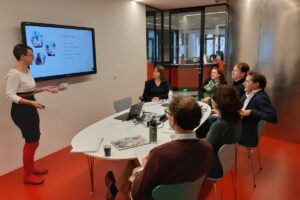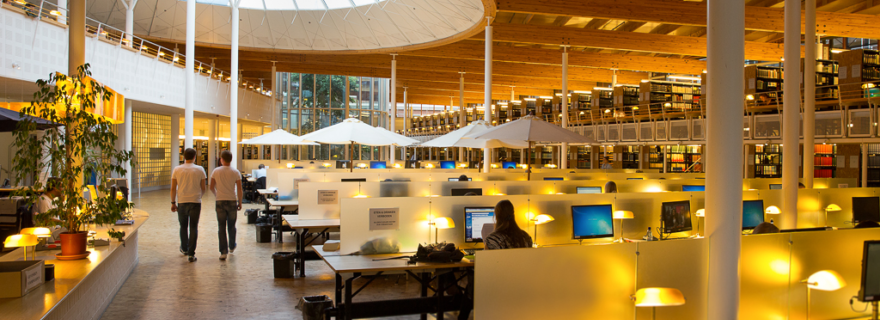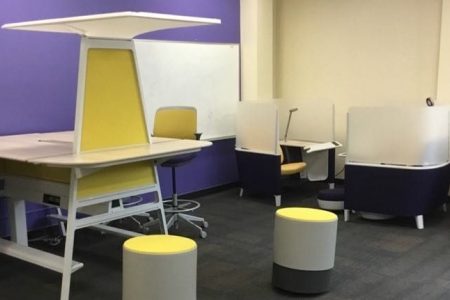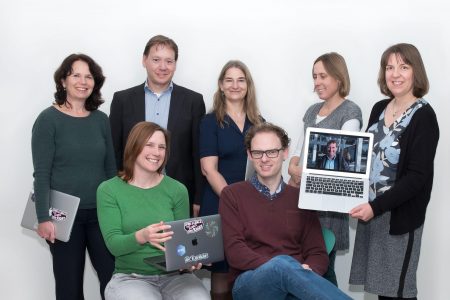The Drivers for Building Creative Spaces in Libraries
This last September, The Centre for Digital Scholarship further developed its plans for a shared learning space that will be built in the CDS location. The facilitator of visioning meeting was Katy Webb from Yale University, who was visiting on a Fulbright grant for three weeks.
The following article was composed by Katy Webb, Director of Access Services at Yale University, in collaboration with the staff at the Centre for Digital Scholarship.
A library creative space is a place in a library where the campus community comes to engage in research and to create something. It is a space set aside for creating new content and to explore new methodologies. Libraries are often described by the number of books or by the location of the buildings, which betrays an outdated view of the library as a physical place to house books only. The library creative space, by contrast, is a studio space where researchers meet with experts and technology to create new types of research and get support. There is almost always some kind of tools, software, or hardware, and the possibility to get help. In Webb’s review of creative spaces in 2018, six models for library creative spaces were observed as being built in libraries at the time. Though there are hybrid spaces, most of them fall into the following types: Scholar’s Lab, Digital Humanities Lab, Data Visualization Lab or Centre, a Digital Media Lab or Centre, a Knowledge Market, or a makerspace. Many of these labs and centres are being built in the libraries of the Netherlands as well, to assist researchers and to support Open Science initiatives.
What are the drivers for building a lab in a library? Recent technological advances have led to a digitalization of processes in the library and the university. Furthermore, there is much more online information that can be scraped and then used via text and data mining in a lab setting. In the EU, and particularly the Netherlands, Open Science, team science, and citizen science have become important movements, which means that support is needed from the academic library. This support comes in the form of expert education for participants in the areas of FAIRification, reproducibility, and open access. A similar trend driving labs, but with a longer history worldwide, is Digital Humanities. At the University of Leiden, there is a network of support and central expertise through the data stewards, which mostly sits within the faculties. It is a powerful, well-established association of people who provide information to researchers in a just-in-time approach to help with research data management and software management. The recent move to implement a national network of Digital Competence Centers, including the local DCCs and the thematic DCCs, will also be a driver for the need for space to meet and collaborate in the academic libraries of the Netherlands. The need for students to develop 21st century transferable skills to take with them as they leave the university and move out into the workforce is another factor in the development of labs. Lastly, with the change in the way people interact after the Coronavirus pandemic, one other development is the support of fully remote, on-site, and hybrid meetings between researchers and expert staff, which will all have to be supported in a library creative space.
Many of these innovative ways in which libraries are engaging with researchers and students are discussed in Katy Webb’s book The Development of Creative Spaces in Academic Libraries: A Decisionmaker’s Guide, which was published in 2018. Webb’s research on space, as well as her expertise in ethnographic and UX research, has also brought her to the Centre for Digital Scholarship in Leiden to help envision the space. She visited the CDS for the first time though a Fulbright grant in 2019, and, following her visit, she published the article Benchmarking Library Creative Spaces for Research Support and Faculty/Librarian Partnerships.

During her second Fulbright visit in September 2022, Webb visited the Digital Competence Centers being formed at Tilburg University and Delft, as well as meeting with people involved with the DCC forming at Leiden. She visited members of the DH Labs from Leiden and Utrecht to see their new lab spaces. She met with a few members of the faculties, including the coordinator of Citizen Science, Margaret Gold. She also provided information to Leiden about advances in hybrid A/V technology for organizing effective meetings. She has visited numerous other labs and creative spaces during her visit to the Netherlands to look for emerging trends.
During her visit, Webb has engaged the staff in the Centre for Digital Scholarship by giving three presentations on library creative spaces, new trends, and ethnographic research. Furthermore, she has met with staff of the CDS to benchmark their activities, using the methodology developed during her first visit. The CDS and other library staff have provided her with their needs for a creative space in the UBL when engaging with researchers. This information was provided through two interactive feedback sessions and will be provided to the library’s management team. Webb is working with Digital Scholarship Librarian Peter Verhaar of the CDS to use text and data mining to look at the mission and vision statements of labs over time, and to see what topics and trends they are following. This, along with work done to consider the context, development, and engagement strategies with the director of the CDS, Laurents Sesink, provides the next step in Webb’s research on library creative spaces.




